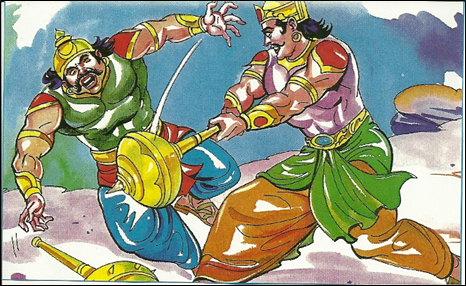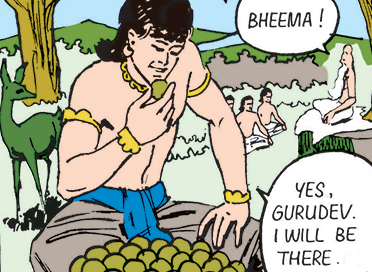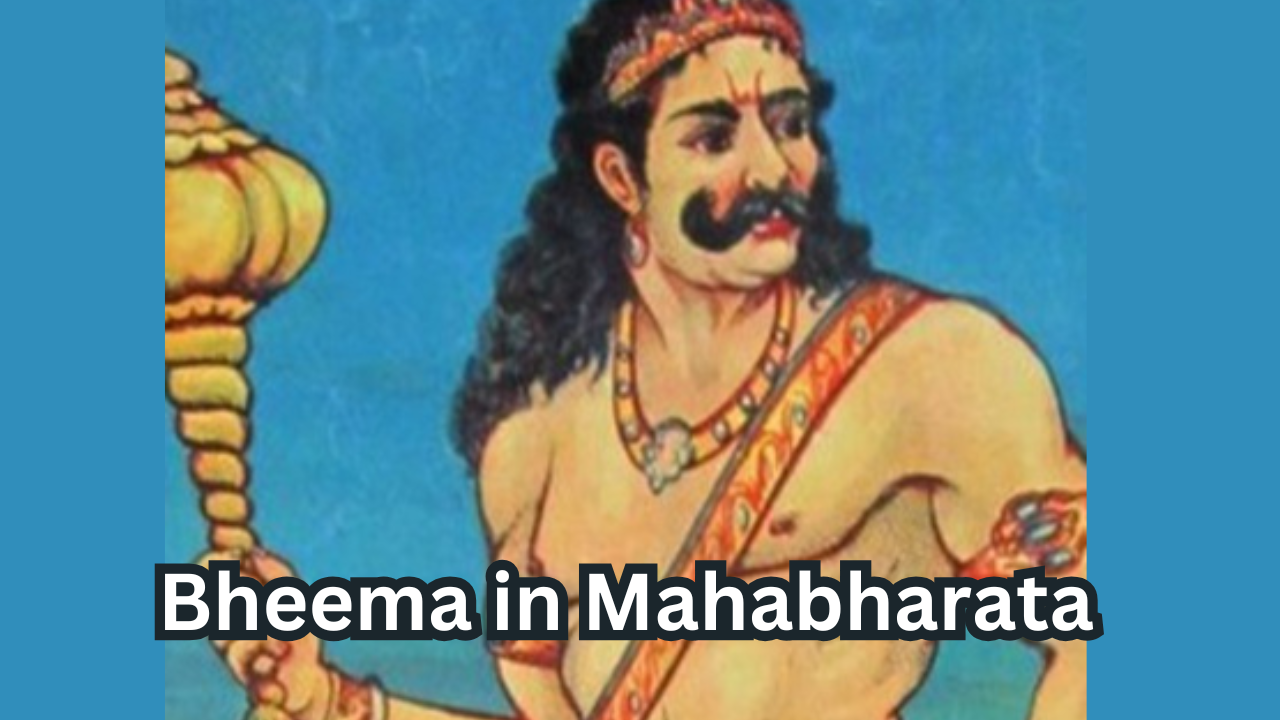The Mahabharata, one of the greatest epics of all time, is filled with characters who embody profound virtues and life lessons. Among them, Bheema stands as the embodiment of strength, loyalty, and resilience. But his character is much more than just raw power. He was a protector, a devoted brother, and a fierce warrior who upheld Dharma in his own unique way.
In this blog, I will take you on a journey to explore Bheema’s life, his role in the Mahabharata, his trials and victories, and the deep spiritual lessons his story imparts. By the end, you’ll see Bheema not just as a warrior but as a symbol of righteous action, fearlessness, and unwavering devotion.
Who Was Bheema?
Bheema was the second of the Pandavas, born to Kunti through the blessings of the wind god, Vayu. This divine lineage made him exceptionally strong and fearless from birth. His childhood was marked by incidents that demonstrated his immense physical prowess, including his confrontations with his cousin Duryodhana, who saw him as a major threat.
Even as a child, Bheema was unshakable in his loyalty to his family. His love for his mother, Kunti, and his brothers, particularly Yudhishthir and Arjuna, was unparalleled. His protective nature often made him aggressive, but it was always rooted in his deep sense of responsibility.
What Made Bheema Special?
1. His Unparalleled Strength
Bheema’s strength was legendary. He was described as having the power of thousands of elephants. His ability to single-handedly defeat entire armies was demonstrated multiple times throughout the Mahabharata.
One of my favorite incidents is when Bheema slays the demon Bakasura. Sent by his mother to deliver food to the demon, Bheema not only refuses to be intimidated but also eats the demon’s food before engaging in a battle and defeating him effortlessly. This episode highlights his confidence, courage, and natural inclination to protect the helpless.
2. His Fearlessness in Battle
Bheema was a warrior who never hesitated to stand against injustice. Whether it was his confrontations with Duryodhana or his fierce duels in the Kurukshetra war, he fought with a passion that was fueled by his deep sense of Dharma.
His moment of absolute vengeance came when he fulfilled his vow to break Duryodhana’s thighs. This was not just an act of revenge but also a fulfillment of a promise he made after Draupadi’s humiliation in the Kaurava court.

3. His Loyalty and Devotion
Despite his fiery temper, Bheema’s love for his family was unwavering. Unlike Yudhishthir, who was bound by absolute righteousness, or Arjuna, who had divine interventions guiding his path, Bheema was a man of action. He did what needed to be done, even if it meant going against conventional morality.
One of the best examples of this is when he swallows the Kauravas’ poison and survives drowning in the Ganga. Even in such moments, he never gives up and rises stronger than before. His survival was not just a testimony to his physical strength but also to his unbreakable willpower.
4. His Role in the Kurukshetra War
In the great war, Bheema was the Pandavas’ greatest force on the battlefield. His battles against formidable warriors like Duryodhana, Dushasana, and the Kaurava generals were legendary.
One of the most iconic moments was when he killed Dushasana and fulfilled his vow to Draupadi. The scene where he drinks Dushasana’s blood is chilling, but it also showcases the depth of his commitment to justice. Draupadi’s humiliation had left an unerasable wound in his heart, and he ensured that those responsible faced the consequences of their actions.
Read More : Famous Mahabharata Characters who had the power to change History!
Bheema and His Spiritual Lessons
While Bheema is often seen as a symbol of raw strength and aggression, there are deep spiritual messages hidden in his story:
1. Strength Must Be Used for Dharma
Bheema’s power was never for personal gain. Every time he fought, it was to protect someone or uphold righteousness. His story teaches us that strength—whether physical, mental, or emotional—should always be used for the right causes.
2. Action Over Words
Unlike Yudhishthir, who relied on ideals, or Arjuna, who often questioned his path, Bheema was a doer. He didn’t overthink; he acted when necessary. In our spiritual journeys, we often get stuck in overanalyzing what is right or wrong, but Bheema teaches us that sometimes, we just need to take action.
3. Perseverance and Willpower
Bheema’s life was filled with challenges—from being poisoned as a child to living in exile to fighting a war for justice. Yet, he never wavered in his duties. This reminds us that perseverance and inner strength can help us overcome any difficulty.
4. The Balance Between Love and Power
Though he was the strongest warrior, Bheema was also the most affectionate brother and husband. His relationship with Draupadi, his love for his son Ghatotkacha, and his unwavering support for Yudhishthir show that true strength also includes compassion and love.
Memorable Quotes and Incidents
- The Yaksha Prashna – A Lesson in Humility
- During the exile, the Pandavas encountered a mystical lake guarded by a Yaksha. Bheema, confident in his strength, ignored the warnings and drank the water, only to collapse. It was only Yudhishthir’s wisdom and humility that saved them.
- This incident reminds us that strength alone is not enough; wisdom and humility are equally important.
- His Final Journey – A Test of Detachment
- When the Pandavas renounced the world and set out towards the Himalayas, Bheema was the second to fall. He asked Yudhishthir why he could not complete the journey, and the answer was a deep lesson: his attachment to food and earthly pleasures held him back.
- This moment teaches us that even the strongest must learn to let go of worldly attachments to attain liberation.

Why Bheema’s Story Matters Today
In today’s world, where people often hesitate to take a stand, Bheema’s story serves as a powerful reminder of courage, justice, and action. Whether it’s fighting against personal demons, standing up for the weak, or persevering through hardships, his life gives us valuable lessons.
In spirituality, strength is not just about physical power but also about mental resilience, emotional stability, and the courage to follow one’s Dharma. Bheema embodies all of these.
To conclude, Bheema’s life is not just an account of a warrior but a guide for how to live fearlessly, act righteously, and balance strength with love. As Krishna said in the Bhagavad Gita: “Dharma will always triumph in the end.” And Bheema’s journey is a testament to that eternal truth.
So, the next time you think of Bheema, remember: he was not just a fighter but a protector, a doer, and a force of unwavering determination. May we all find the strength to stand for what is right, just as he did.

